Watch as reporter becomes an animal keeper for the day at Washington Wetland Centre
and live on Freeview channel 276
That initial spark was ignited almost 40 years ago when I visited the Washington Wetland Centre as a six-year-old on a school trip with St Bede’s Primary School.
Like many youngsters in the town, further trips followed with both my parents and the school before the distractions of adulthood and the world of work curtailed my regular visits.
Advertisement
Hide AdAdvertisement
Hide AdIt was the arrival of my two young children and moving back to the North East to the nearby Teal Farm which reawakened my relationship with the centre.
Looking to ignite that similar spark and love of the outdoors, as a family we have enjoyed several days out at the centre to feed the birds and enjoy what truly is an oasis of tranquillity and nature in a predominantly urban environment.
So when, as part of our ‘Day in the Life of’ feature, I got the opportunity to experience being an animal keeper for the day at the Wetland Centre I jumped at the chance.
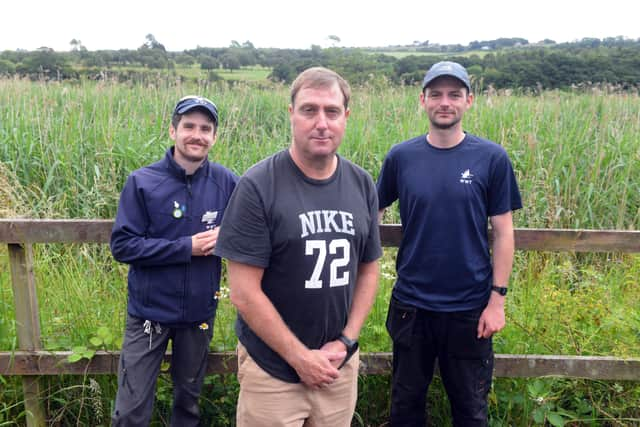

After arriving at the centre my first job was to undertake a head count of the bird populations in each of the enclosures - not a particularly easy task as I discovered as the array of different birds didn’t seem to stay in one place for very long.
Advertisement
Hide AdAdvertisement
Hide AdAnimal keeper Dan Morrison, 26, said: “We have over 300 different birds in our enclosures and it’s important to check each morning that none have gone missing through illness or even predation.”
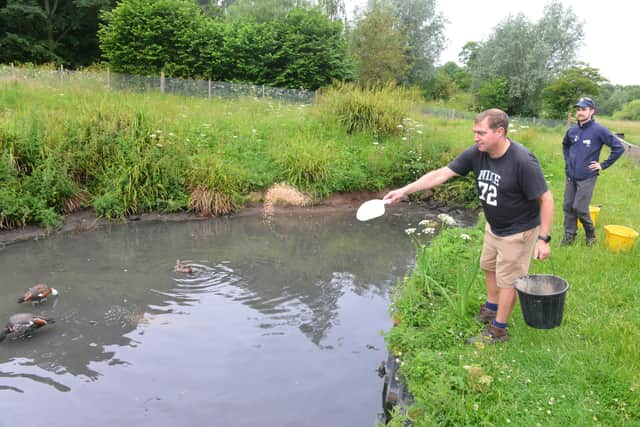

However, it’s not just losing birds which can be an issue as Dan recounted one particularly amusing story.
He said: “We came down one morning to find a red breasted goose on our wild lagoon. This is a bird normally found in Siberia and parts of Eastern Europe, not England, and so we assumed one of our birds had escaped from its enclosure.
“We were wondering how it had got out but a quick count revealed it was in fact a wild bird which had landed at the centre.
Advertisement
Hide AdAdvertisement
Hide Ad“One of our jobs is to post on our website what birds we have seen and we got a number of people heading down to the centre to see this rare sighting.”
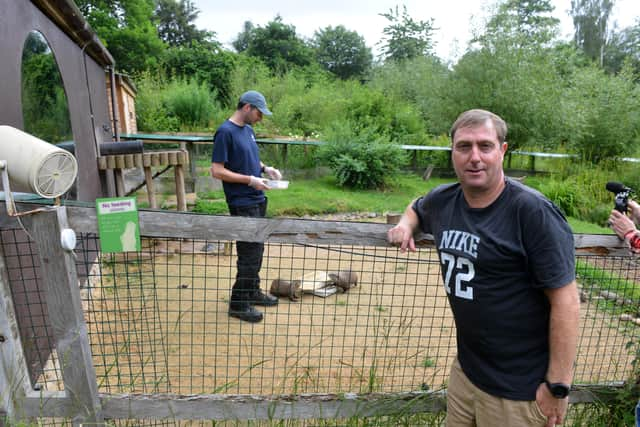

Next up it was feeding time, and where better to start than with the Chilean flamingos.
“The birds seem to know when it’s feeding time and get particularly excited when they see our blue shirts arriving,” said Dan.
The striking birds looked resplendent as their pink sheen shimmered in the watery June sunlight.
Advertisement
Hide AdAdvertisement
Hide AdI was already aware of the role the flamingos’ staple diet of algae and shrimp play in providing the birds with their distinctive colour when ingested.
However, looking at the rather dull pellets, while the birds’ pink feathers reflected off the pond, I was a little confused as to how these flamingos were maintaining their colour.
Dan said: “The pellets contain all the things the birds need, including the carotenoids which give them their pink colour.
“The gulls also like these pellets and so I often have to stand guard and sometimes scare them off.”
Advertisement
Hide AdAdvertisement
Hide AdNext it was time to feed the resident family of otters, Mimi, Musa and their son Buster.
I had eagerly anticipated getting close to these characterful creatures and so I was somewhat deflated when keeper Alex Richings said I wouldn’t be able to go into the enclosure due to concerns they may get a little too close.
Alex, 31, said: “These are probably the centre’s most popular animals but they do like to have a nibble. That’s why I have to wear steel toe-capped boots.
“They all have different characters and you get to know them and they get to know you.”
Advertisement
Hide AdAdvertisement
Hide AdI quickly put my disappointment to one side to get stuck into the rather smelly task of cutting up the range of fish for the otters morning feed.
The family are fed four times a day with a set menu specifying the type of fish and specific weights which need to be measured out.
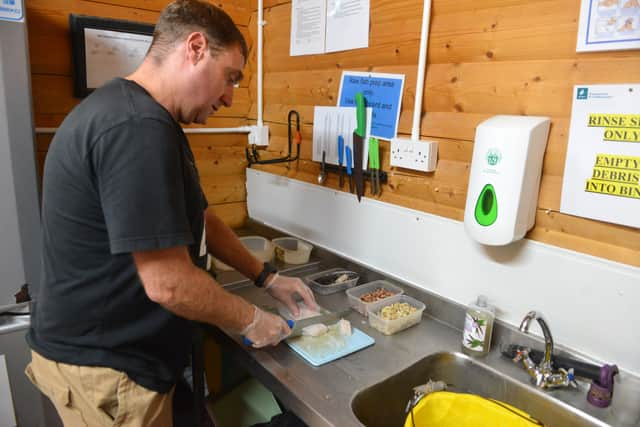

Feeding time over, the awww factor was about to be ramped up as we made our way to the duckery to check in on the latest fluffy arrivals.
The indoor incubator was home to just one current inhabitant, a white fronted gosling which arrived just one week ago.
Advertisement
Hide AdAdvertisement
Hide AdAlex said: “We take in all our hatchlings to prevent them from being predated by rats or crows.”
Hygiene is paramount for the health of the hatchlings and so it was time for this reporter to get stuck into cleaning out the incubator pen by sweeping up the poo and washing out the mini enclosure.
With time fast approaching for Alex and Dan to deliver their otter and flamingo talks to the visiting public - a key part of their daily duties - it was time for me to return to my laptop and leave the world of animal keeping behind.
As I made my way towards the exit, a whole host of school children were entering the centre, many a similar age to when I made my first visit as a wide eyed six-year-old.
Advertisement
Hide AdAdvertisement
Hide AdMaybe today some of these children will have that same spark ignited and begin to develop their own love of nature and the wildlife which surrounds our city.
Meet the keepers
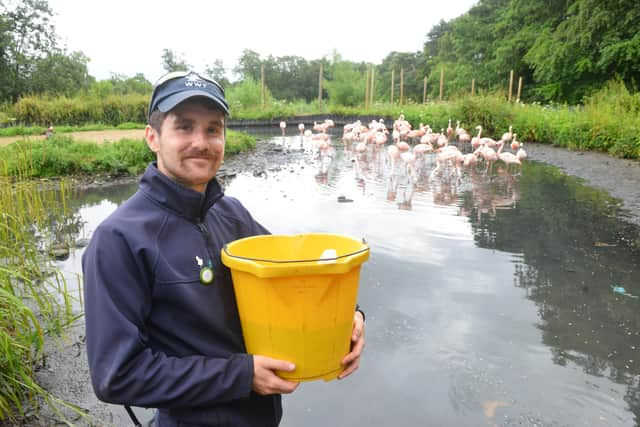

After several years working in the hospitality industry, in 2022 keeper Dan Morrison, 26, decided to swap looking after people for taking care of animals.
Dan sees one of his key roles as engaging people in wildlife conservation - also one of the primary aims of the centre.
He said: "We have species from all over the world, many of which people wouldn't ordinarily get to see and a number of them are endangered.
Advertisement
Hide AdAdvertisement
Hide Ad"We are the UK' biggest wetland conservation charity and so as well as helping to maintain populations, a big part of conservation is educating people as well as hopefully engaging them in the importance of protecting our wildlife.
"It's important people understand just why wetlands are so important for us and the wildlife that live there. We can also show people what we are doing to conserve them and how their donations help.
Part of this process is daily talks which Dan delivers to the public.
He said: "To be honest, I was quite a shy shy person before I started working here but delivering talks everyday really pushes you out of your shell.
"It's something I now really enjoy doing."
Advertisement
Hide AdAdvertisement
Hide AdAs well as caring for the animals, Dan is also responsible for site maintenance, including any repairs which need to be carried out on the animal pens.
He added: "This is probably the most difficult part of the job for me as I'm still quite new to it but I still enjoy it as I like working with my hands.
"I love working with animals and you really do build a relationship with them, particularly the otters."
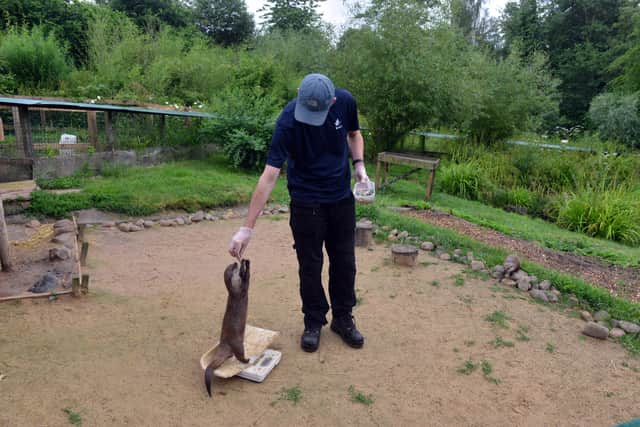

It really is a labour of love for keeper Alex Richings, 31, who also swapped working in the hospitality industry for looking after the animals and birds at the centre.
Advertisement
Hide AdAdvertisement
Hide AdHe said: "I used to work in pubs and restaurants but I wanted a change. I started off by volunteering at the centre and it eventually became a permanent role.
"The best things about the job is being able to work outside and I've always loved animals and so this is an ideal job.
"I love being out in the sun and all different types of weather. There isn't really a downside to the job, although it does get pretty cold in winter."
Alex's typical day will entail checking the animals are okay as well as giving the birds and the otters their daily feeds, which also need to be prepared and delivered in the correct quantities.
Advertisement
Hide AdAdvertisement
Hide AdAlex particularly enjoys working at the centre during spring and early summer.
He added: "We've obviously got the hatchlings at this time and I check they are okay in the duckery. It's an exciting time and the public love to see the new arrivals."
Comment Guidelines
National World encourages reader discussion on our stories. User feedback, insights and back-and-forth exchanges add a rich layer of context to reporting. Please review our Community Guidelines before commenting.